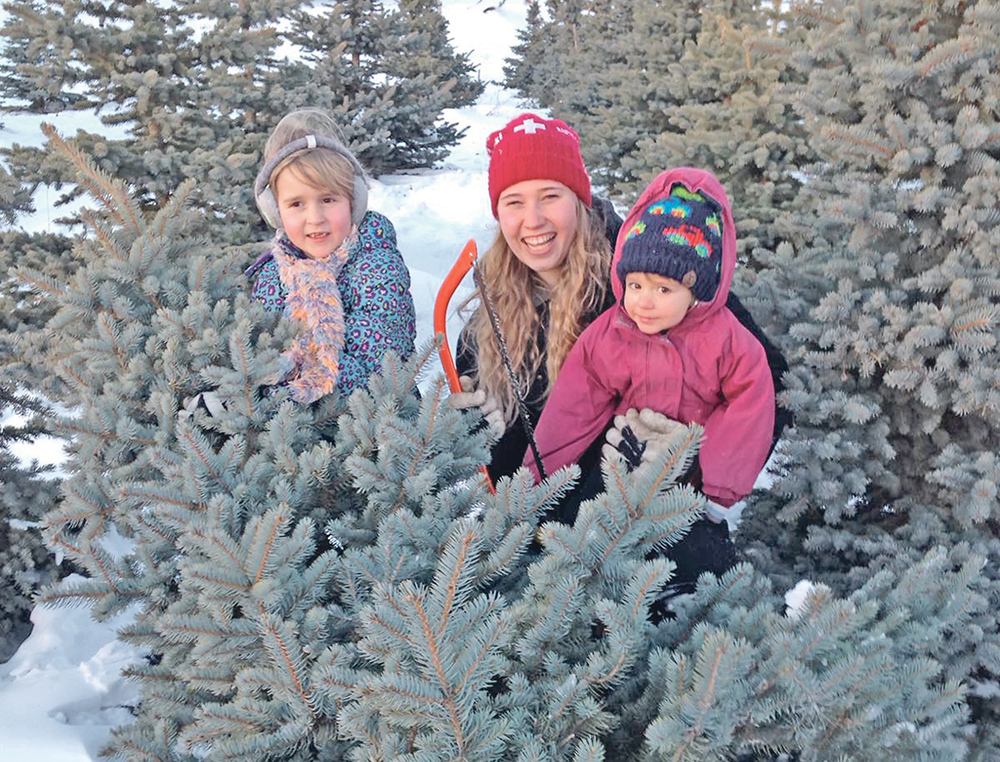Nasty weather takes toll on Christmas trees

Christmas tree growers across Western Canada faced challenging weather conditions this year; from extremely high temperatures and not enough rain in the summer to recent excessive rainfall and flooding.
But with the holiday season in full swing and Christmas trees in high demand, growers are more optimistic.
“We’re farmers and we deal with Mother Nature,” said Tracy Bain, Prairie Christmas Tree Grower’s Association president.
At Saanichton Christmas Tree Farm on Vancouver Island’s Saanich peninsula, Joan Fleming said she was looking forward to welcoming families to her five-acre farm where they can choose and cut their own tree.
Fleming and her late brother Mike started the business 40 years ago and now Joan’s daughter Olivia is involved in growing nine fir tree varieties, western and eastern white pines and Norwegian and Colorado blue and green spruces.
“A lot of families make it a tradition to cut their own trees,” Fleming said.
This summer’s heat dome in British Columbia caused evergreen needles to scorch, but Fleming said she was fortunate.
“A lot of Christmas tree farmers completely lost their crops. I have an irrigation system on my farm and I only watered at night.”
However the 50 acres of trees the Flemings grow up-island near Shawnigan Lake weren’t irrigated. Fleming said surprisingly most of these trees weren’t damaged, possibly because they are located at a higher elevation.
Interviewed days after extreme rainfall caused widespread flooding and closed major highways in southern B.C., Fleming said she was waiting for roads to reopen so she could have cut trees trucked in from B.C.’s East Kootenay region. “They can’t get the transportation needed to get me those trees.”
Fellow B.C. Christmas tree grower Paul Huesken was also seeing transportation issues as he was trying to move trees from two locations in B.C.’s Interior to his home farm near Chilliwack. Huesken runs Woodsong Christmas Trees, a third-generation family business, with wife Bev.
While flooding was the current problem impacting the Hueskens’ business, just a few months earlier it was the heat that singed needles and damaged spring seedlings. Huesken said a few tree growers near Salmon Arm, B.C., lost most of their trees.
Some varieties were harmed more than others depending on when they hit their peak growth, Huesken said, adding that Douglas and Grand firs were less damaged while his Fraser fir trees suffered the most damage.
Two provinces away, Mike Kisiloski, who operates Country Pine Tree Farm near Tyndall, Man., said his seedlings were badly damaged as he wasn’t able to irrigate his property throughout a prolonged drought. “The drought really took me apart. You’ve got to get the rain in May and June.”
Kisiloski started growing scots pine, white spruce and balsam fir trees on the area’s acidic soil in 1991, then waited the nine years needed for the trees to grow to a height suitable for cutting.
His property is about a half-hour drive from Winnipeg and he said that once he opens for the season in late November there’s usually a lineup of customers’ cars on the gravel road that runs past his farm.
He imports trees from Ontario and Quebec to supplement his own stock but he was expecting to sell out fast this year because demand for live trees is growing and the number of Manitoba tree farms is decreasing.
Cliff Freund, who has operated CD Trees near Steinbach, Man., since 1996, estimated that there are just three or four growers left in southeastern Manitoba where there once were a dozen. Due to the drop in tree farms, there is no longer an active Manitoba Christmas tree growers association.
“It’s a lot of hard work with limited return,” Freund said.
The Prairie Christmas Tree Grower’s Association has about 17 members in Saskatchewan and eight in Alberta. Association member Peter Kappeler and wife Judy run Fir Ever Green Farm near Falun in central Alberta. Kappeler said growing evergreens is in his blood as his family had a tree farm in Europe.
Soil conditions on the Kappelers’ farm restricts the varieties of trees that will grow well but he believes the cold climate provides an advantage.
“We’re very limited on what we can produce but we grow some of the best quality trees in Canada,” Kappeler said. He attributes the harsh weather with the trees’ ability to retain their needles better than trees grown in more moderate conditions. “They need the frost to keep their needles.”
This summer’s hot and dry weather also seriously impacted the Kappelers’ trees. “The established trees didn’t grow as much. We lost thousands of seedlings and will have to replace them.”
Kappeler agreed with Freund in that it takes a lot of patience to be a tree grower. “It takes from 10 to 12 years for a tree to grow. It’s a long process to be a Christmas tree producer,” he said, adding that he might just earn $80 for a tree that took him eight years to grow.
Dorian Girardin and his family run Hill Haven Christmas Trees, growing scots pine and white spruce near Sidney, Man. While Girardin offers customers that chance to cut their own tree, he also supplies a few tree lots and offers pre-orders for trees.
Last year’s pandemic restrictions forced Girardin to set up curbside pick-up, but this year he’s pleased to be able to have customers come in-person to his farm and enjoy a family outing.
“This year we’re going to be normal,” he said.
Source: producer.com

